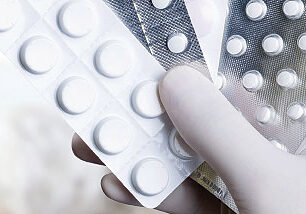Can Chemotherapy Drugs Harm People?
- The risks to people caring for pets receiving chemotherapy are small, however unnecessary exposure to these drugs should be avoided
- Pregnant women (or those planning to start a family), and young children should not handle chemotherapy medication (this is simply a sensible precaution)
- Using proper techniques when handling, administering or disposing of chemotherapy drugs will maximise the benefits to your pet and minimise the risk to people.

Precautions for Handling Chemotherapy Drugs
- Always wear gloves when handling your pet’s medication and don’t crush or split medication unless asked to do so
- Try to make sure your dog or cat swallows the medication and does not spit it out
- Keep a pet’s medication stored away from food areas and in the original container which will be child-proof and clearly labelled
- After use, dispose of gloves in two plastic bags (‘double bagging’ technique) and tie firmly at the top.
- Wash hands after removing gloves.
- Keep all medication, containers and waste away from children

Disposing of a Pet’s Waste?
Much of this information merely reinforces common sense and good hygiene precautions, which should always be followed when caring for your pet.
- Always wear gloves when coming into contact with pet waste such as faeces, urine or vomit
- Dispose of faeces and solid waste by flushing down the toilet
- Try to absorb any fluid waste with paper towels and dispose of by double bagging. The aim is to ‘contain and absorb’ any contamination rather than ‘dilute and distribute’
- The final cleaning process for household areas soiled with vomit, faeces or urine should include household products containing bleach.
- If clothes, bedding, towels etc. are soiled, these should be machine washed separately to normal household laundry
- For cats, clean the litter tray as soon as possible after it has been used. Remove faeces and flush down the toilet. Dispose of litter by the double bagging technique and clean the tray regularly. Keep children away from litter trays.
Can dogs Receiving Chemotherapy use the Garden?
Yes, however dogs should be restricted to one area of the garden to minimise exposure. Clean up faeces/stools as soon as possible and keep family and visitors away from this designated area.
How Long should these Measures be Continued for?
The precautionary measures stated above should be continued during treatment and for seven days after your pet has received the last dose. This seven day period represents the longest time it should take for most drugs to be fully eliminated from the body. This time is taken from studies in people and it is safest to assume the same is generally true with dogs and cats.
Reference Hayes, A. (2005) Safe use of anti-cancer chemotherapy in small animal practice. In Practice, 27, 118-127
To save this page as a PDF, click the button and make sure “Save as PDF” is selected.
Cancer Care
Find out more
To assist owners in understanding more about Cancer Care we have put together a range of information sheets to talk you through the some of the more common conditions seen and treated by our Specialists.

